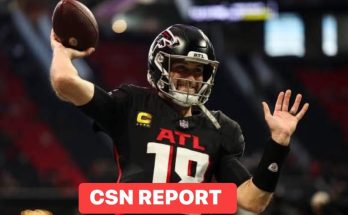The Carolina Panthers made waves in the NFL world this week with a roster shake-up that signals a bold direction during training camp. In a move that surprised insiders and fans alike, the franchise officially announced the signing of rookie cornerback Xavier Dotson, while simultaneously releasing former Pittsburgh standout MJ Devonshire. The dual-action maneuver has quickly become one of the most talked-about early training camp developments and could have lasting ripple effects on the team’s defensive depth chart and culture.
Dotson, a rangy, high-IQ cornerback who was recently undrafted out of a small but competitive FCS program, had quietly been rising on the radar of a few NFL franchises. Though he never earned the national spotlight of some of his Power Five counterparts, Dotson made his name with consistently strong performances in man coverage, ball-hawking instincts, and a willingness to tackle—something Panthers coaches have sorely craved in their secondary. His impressive performance at a regional combine had several scouts intrigued, but it was his private workout with the Panthers earlier this summer that turned intrigue into commitment.
According to team sources, Dotson’s football intelligence and relentless work ethic were what won over the coaching staff and front office. In film review sessions, he displayed a remarkable ability to diagnose offensive formations and anticipate routes. Defensive backs coach Jonathan Cooley reportedly told colleagues that Dotson was “already two years ahead mentally” of most rookies, even comparing his cerebral command to some of the league’s elite veteran corners. While praise like that often carries a measure of hyperbole during training camp optimism, it speaks volumes about how the organization views Dotson’s potential.
Dotson didn’t merely flash in meetings—he backed it up on the field. Early reports out of training camp practices suggest the rookie corner has been sticky in coverage, particularly excelling against second-team wide receivers. His transition out of breaks, ability to mirror receivers, and timing on jump balls have turned heads. One coach was overheard calling him a “natural-born disruptor,” a rare compliment that highlights his capacity to create turnovers and break up rhythm in the passing game. In an era where defensive backs are required to cover athletic freaks and route technicians, Dotson’s technical sharpness is a breath of fresh air.
On the other end of this transaction is MJ Devonshire, whose release raised more than a few eyebrows. A highly touted UDFA signing after the 2024 draft, Devonshire had shown flashes of ability in last year’s preseason and was projected to compete for a slot or dime corner role heading into 2025. Coming out of the University of Pittsburgh, Devonshire was known for his blazing speed, ball skills, and big-play ability, both as a corner and as a return man. Some fans expected he’d continue his upward trajectory this offseason, particularly after reports in the spring suggested he had added muscle and refined his footwork.
But sources close to the team suggest Devonshire had a rocky start to training camp. Multiple blown coverages in scrimmages, combined with inconsistent tackling and lapses in communication, put him in a vulnerable position. Coaches emphasized that in this new phase of rebuilding under head coach Dave Canales, mental mistakes and lack of discipline would not be tolerated, especially on the defensive side of the ball. While no single play doomed Devonshire, insiders believe a series of small missteps stacked against him, leading to a decision that surprised even some in the building.
Still, the Panthers’ decision wasn’t made in isolation. This roster move is part of a broader recalibration strategy being implemented by general manager Dan Morgan and Canales, who are looking to reshape the team into a younger, faster, and more disciplined unit. The message sent by cutting Devonshire and bringing in Dotson is clear: upside, intelligence, and accountability now matter more than past reputation or athletic measurables alone. This echoes comments Canales made during OTAs, where he insisted that competition would be “as real and ruthless as ever” and that “names don’t matter—performance does.”
Adding to the intrigue is how quickly Dotson integrated into the team. Less than a week after arriving, he reportedly earned second-team reps and was inserted into several critical sub-package drills. Veteran safety Xavier Woods noted during media availability that Dotson was “already barking out adjustments like a guy who’s been here for years.” That level of early trust from veteran defenders bodes well for Dotson’s chances to secure a 53-man roster spot, perhaps even pushing for nickel or dime duties as early as Week 1.
What’s more, Dotson’s emergence may allow the Panthers greater flexibility in how they deploy their secondary. With veteran corners like Jaycee Horn and Dane Jackson expected to handle boundary responsibilities, the team has been searching for a reliable presence inside. Last year’s experiment with C.J. Henderson in the slot yielded mixed results, and young players like D’Shawn Jamison have yet to lock down a consistent role. If Dotson continues his current trajectory, he may force defensive coordinator Ejiro Evero to reconsider some early depth chart assumptions.
The decision also brings into focus the challenges of building a competitive secondary in today’s NFL. The league is more pass-heavy than ever, and corners are being asked to not only cover elite athletes but also contribute in run support and zone awareness. It’s no longer enough to have raw speed or length—mental acuity and the ability to process information in real-time are now essential traits. In that light, Dotson’s signing represents more than just a camp flyer—it’s a cultural statement.
Devonshire, for his part, isn’t necessarily done in the NFL. At just 24 years old with excellent athletic tools, he could find a second opportunity elsewhere. Teams in need of speed on special teams or looking to develop a raw but talented defensive back might take a flier. However, the fact that Carolina, a team still finding its identity on defense, was willing to part ways with him this early could serve as a cautionary tale about the unforgiving nature of life on the NFL bubble.
This roster move is also notable for its timing. Coming early in camp, it allows Dotson maximum exposure to the system and gives him several weeks to stake his claim before preseason games begin. It’s a smart tactic from the front office—a proactive shift rather than a reactive correction, signaling an organizational philosophy that values decisiveness over inertia. It also sends a message to other bubble players: no one’s spot is safe, and every rep counts.
The Panthers are entering a pivotal year. With a young quarterback in Bryce Young still developing, a restructured offensive line, and a defense trying to shed its inconsistencies, Carolina needs to find contributors wherever it can. Smart, hungry players like Dotson may become the backbone of the next great Panthers team. His journey from unheralded prospect to legitimate roster contender is the kind of narrative that not only fuels fans but also energizes locker rooms—especially those searching for leadership and direction.
While it remains to be seen whether Dotson will stick through final cuts or become a regular-season contributor, all signs point toward a player on the rise. His instincts, composure, and understanding of the game already give him an edge that’s rare for rookies. If he continues to ascend through camp and holds his own in preseason action, don’t be shocked if Dotson not only makes the roster but earns rotational snaps early in the season.
Meanwhile, the departure of Devonshire underscores the razor-thin margins that define life in the NFL. One year you’re the promising young defensive back with return skills and upside; the next, you’re jobless in July, a victim of momentum and miscalculation. The Panthers’ willingness to make the switch so swiftly speaks volumes about how seriously this staff takes competition and precision. There’s little room for error in the NFL, and even less patience for regression.
Ultimately, the Dotson-Devonshire saga may be remembered not just for what it says about two players, but what it reveals about the Panthers’ evolving identity. For a franchise trying to reassert itself in the NFC South and restore the grit that once defined it, betting on high-IQ, detail-oriented, and self-driven players may be the path forward. This moment, minor as it may seem on the surface, could very well be a small but telling step in a broader rebuild—one that places mental sharpness and consistency on equal footing with athleticism and speed.
As training camp progresses, all eyes will be on Dotson to see if he can keep pace with rising expectations. For now, though, he’s done everything right—he showed up prepared, took advantage of his opportunity, and proved he belongs. In a league obsessed with potential and plagued by parity, sometimes that’s enough to change everything. And in Carolina, where change is not just welcomed but demanded, Dotson’s arrival might be more than a camp headline—it could be the beginning of a quiet revolution.



